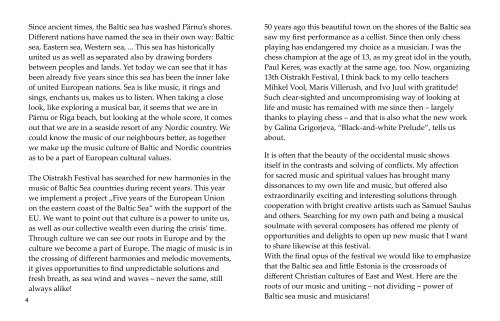David Oistrahhi Festival, 12. – 25. juuli, 2009, Pärnu David Oistrakh ...
David Oistrahhi Festival, 12. – 25. juuli, 2009, Pärnu David Oistrakh ...
David Oistrahhi Festival, 12. – 25. juuli, 2009, Pärnu David Oistrakh ...
You also want an ePaper? Increase the reach of your titles
YUMPU automatically turns print PDFs into web optimized ePapers that Google loves.
Since ancient times, the Baltic sea has washed <strong>Pärnu</strong>’s shores.<br />
Different nations have named the sea in their own way: Baltic<br />
sea, Eastern sea, Western sea, ... This sea has historically<br />
united us as well as separated also by drawing borders<br />
between peoples and lands. Yet today we can see that it has<br />
been already five years since this sea has been the inner lake<br />
of united European nations. Sea is like music, it rings and<br />
sings, enchants us, makes us to listen. When taking a close<br />
look, like exploring a musical bar, it seems that we are in<br />
<strong>Pärnu</strong> or Riga beach, but looking at the whole score, it comes<br />
out that we are in a seaside resort of any Nordic country. We<br />
could know the music of our neighbours better, as together<br />
we make up the music culture of Baltic and Nordic countries<br />
as to be a part of European cultural values.<br />
The <strong>Oistrakh</strong> <strong>Festival</strong> has searched for new harmonies in the<br />
music of Baltic Sea countries during recent years. This year<br />
we implement a project „Five years of the European Union<br />
on the eastern coast of the Baltic Sea“ with the support of the<br />
EU. We want to point out that culture is a power to unite us,<br />
as well as our collective wealth even during the crisis’ time.<br />
Through culture we can see our roots in Europe and by the<br />
culture we become a part of Europe. The magic of music is in<br />
the crossing of different harmonies and melodic movements,<br />
it gives opportunities to find unpredictable solutions and<br />
fresh breath, as sea wind and waves <strong>–</strong> never the same, still<br />
always alike!<br />
50 years ago this beautiful town on the shores of the Baltic sea<br />
saw my first performance as a cellist. Since then only chess<br />
playing has endangered my choice as a musician. I was the<br />
chess champion at the age of 13, as my great idol in the youth,<br />
Paul Keres, was exactly at the same age, too. Now, organizing<br />
13th <strong>Oistrakh</strong> <strong>Festival</strong>, I think back to my cello teachers<br />
Mihkel Vool, Maris Villerush, and Ivo Juul with gratitude!<br />
Such clear-sighted and uncompromising way of looking at<br />
life and music has remained with me since then <strong>–</strong> largely<br />
thanks to playing chess <strong>–</strong> and that is also what the new work<br />
by Galina Grigorjeva, “Black-and-white Prelude”, tells us<br />
about.<br />
It is often that the beauty of the occidental music shows<br />
itself in the contrasts and solving of conflicts. My affection<br />
for sacred music and spiritual values has brought many<br />
dissonances to my own life and music, but offered also<br />
extraordinarily exciting and interesting solutions through<br />
cooperation with bright creative artists such as Samuel Saulus<br />
and others. Searching for my own path and being a musical<br />
soulmate with several composers has offered me plenty of<br />
opportunities and delights to open up new music that I want<br />
to share likewise at this festival.<br />
With the final opus of the festival we would like to emphasize<br />
that the Baltic sea and little Estonia is the crossroads of<br />
different Christian cultures of East and West. Here are the<br />
roots of our music and uniting <strong>–</strong> not dividing <strong>–</strong> power of<br />
Baltic sea music and musicians!



